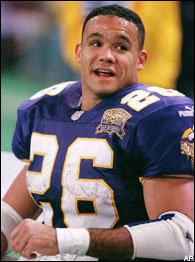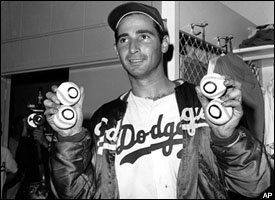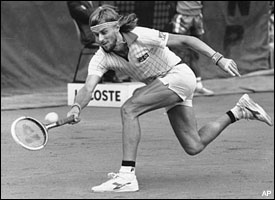Page 2
If Ricky Williams stays retired, he'll be the unusual -- but not unique -- pro athlete who walks away with good years (and good money) remaining. These are the 10 greatest, earliest sports retirees, guys who left their sports when they could still really play. We didn't consider guys who retired early and came back -- Michael Jordan, Mario Lemieux, Ryne Sandberg, Sugar Ray Leonard -- or guys who were forced to leave early due to injuries, like Bo Jackson or Don Drysdale.
The 10 are listed not in order of absolute greatness, but in order of what they still, probably, had left.
10. Jackie Jensen
In November 1958, Jensen received the AL MVP award after batting .286 with 35 homers and 122 RBI. A few months later, he penned a Saturday Evening Post article entitled "My Ambition Is to Quit." And 10 months later, he did just that at age 32, citing both a desire to be with his family and a fear of flying as the main causes. He sat out the 1960 season, but was lured back in 1961. But he refused to take several road trips, including a July West Coast swing. The Red Sox said they wouldn't pay the slugger during his absences, and he finally retired for good after 1961.
In the six seasons between 1954 and 1959, Jensen hit 157 homers and drove in 667 runs. He was a three-time All Star and led the league in RBI three times, including both 1958 and 1959.

9. Robert Smith
The Vikings' running back had ranked second in the NFL with 1,521 yards rushing in 2000, his fourth straight 1,000-yard season. But in the spring of 2001, at just 28 years old and a free agent who could have expected a long-term deal worth $40 million, Smith called it quits by faxing in his announcement to a newspaper.
Smith is back in the news with a new book, "The Rest of the Iceberg: An Insider's View on the World of Sport and Celebrity." In it, he cited reasons for his retirement, including the tedious nature of six days of practice, leaving while still healthy, and believing the Vikings' window of Super Bowl opportunity had closed.
8. Isiah Thomas
In April 1994, Thomas, 32, ripped his Achilles tendon. Less than a month later, he announced his retirement, but said the injury was not a factor in leaving the court after 13 seasons in Detroit. "The Achilles' injury wasn't the problem," Thomas said. "I'll be walking next week. The thing that makes me good is the energy and intensity I can bring to the game every night. I don't have that type of energy anymore. I don't have that rah, rah rah anymore. There's just no more energy left in my body."
In his final season with the Pistons, Thomas played 59 games, and battled other injuries, including a broken rib and a hyperextended knee. Still, managed to average 14.8 points and 6.9 assists per game. The Pistons finished the 1993-94 campaign with a 20-62 record, one of the worst in the NBA.
7. Otto Graham
Graham, besides being a great quarterback, had two of the greatest streaks in NFL history: in each of his 10 seasons he took his team, the Cleveland Browns, to the title game (The AAFC 1946-49, the NFL 1950-1955). And he never missed a game.
After the 1954 season, in which he led the Browns to the NFL title, he announced his retirement at age 33. He was persuaded to join the Browns for one more year, and, in 1955, again led them to the title, scoring two TDs as the Browns trounced the Rams before a crowd of 87,695 in L.A.. In his final season, Graham was named the player of the year by the United Press and the 1955 Pro Athlete of the Year.

6. Sandy Koufax
Koufax retired at age 30, directly citing a fear of permanent injury to his arthritic left elbow. Koufax, then making $125,000 a season, had just won his second straight Cy Young Award after going 27-9 with a 1.73 ERA in 1966. Don Drysdale was surprised by the November announcement, and although nobody questioned that Koufax was indeed suffering severe arm problems, at least one, AL president Joe Cronin, wished he had soldiered on. "He's too young to retire," Cronin said. "I'm sure from what he did last season he could go on pitching for a good many more seasons."
5. Doak Walker
One of the greatest college football players of all time, Walker was considered too small to succeed in the pro game. But the Lions acquired the 5-foot-11-inch, 173 pound back before his 1950 rookie year, and he repaid them by being named All-NFL in five of his six seasons and leading Detroit to NFL championships in 1952 and 1953. He twice led the NFL in scoring, as a running back/kick returner/kicker. Walker, a Hall of Famer, walked away from football at age 29, saying he wanted to pursue a business career.
Walker died in 1998 after being paralyzed in a skiing accident. Ricky Williams, two-time winner of the Doak Walker Award, given to the top college running back in the country, met Walker in 1997. The two became friends, and after Walker died, Williams honored his hero by wearing Walker's number, 37, in the Texas-Oklahoma game. "Doak Walker was who I want to be," said Williams.
4. Rocky Marciano
After going 49-0 as a pro, Marciano, the world heavyweight champ, announced his retirement in April 1956 after a year of speculation. The Brockton Blockbuster was only 31.
"I didn't get hurt physically while fighting," Marciano said. "My physical condition has nothing to do with my retirement. ... My lonesome family convinced me that I should quit while I'm still in good shape."
Marciano vowed not to repeat the mistakes of past champs, like Joe Louis, who had attempted comebacks after announcing their retirements. But Archie Moore, the light-heavyweight champ and Marciano's last victim, didn't believe it would stick. "Marciano won't quit, because he loves the jingle of the American dollar too much," Moore said.
Moore, who himself first announced his retirement in 1941, 23 years before he finally took off his gloves for good, was wrong. Marciano didn't come back.
3. Bjorn Borg
After winning five straight Wimbledon championships between 1976 and 1980, Borg, who'd prevailed over great rivals like John McEnroe and Jimmy Connors, announced he was quitting the game on Jan. 22, 1983. Borg, who had turned pro at 16, was only 26.

"I know I could play another five years," Borg told Neil Amdur of the New York Times. "So to make this step, I wanted to be 101 percent sure before I decided. To retire at 26, that's very, very young. Just telling the simple truth that I don't enjoy it, I'm not motivated and I need to try other things. To take that step is difficult for a lot of people."
2. Barry Sanders
Sanders was only 31 and within 1,500 yards of breaking Walter Payton's career rushing record when he hung up his cleats just before training camp began in 1999. "The reason I am retiring is very simple," Sanders said in a statement. "My desire to exit the game is greater than my desire to remain in it."
In 1998, Sanders, a Pro Bowl selection all 10 of his NFL seasons, had run for 1,491 yards on 343 carries. The Lions made the playoffs in five of his 10 years, but had won just one playoff game.
1. Jim Brown
After nine seasons with the Browns, the great fullback retired in 1965 at age 30. In his final season he rushed for 1,544 yards on 289 carries, scored 21 TDs, and was named MVP in leading the Browns to the NFL title game. He had led the NFL in rushing yards in eight of his nine seasons and left the game as its all-time leading rusher.
Brown announced his retirement in a mid-July press conference in London, near where "The Dirty Dozen" was being filmed. He still had one year to go on a contract that paid him $60,000 a season.